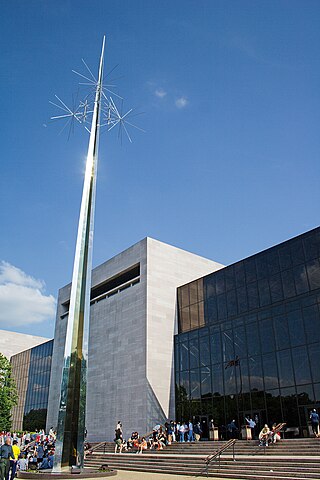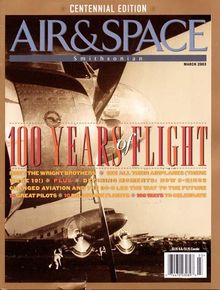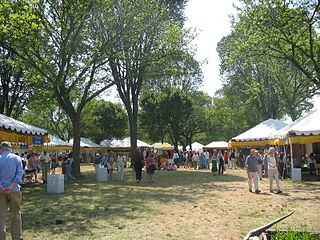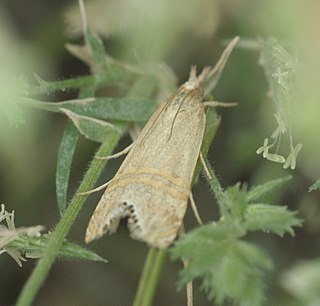
A language family is a group of languages related through descent from a common ancestral language or parental language, called the proto-language of that family. The term "family" reflects the tree model of language origination in historical linguistics, which makes use of a metaphor comparing languages to people in a biological family tree, or in a subsequent modification, to species in a phylogenetic tree of evolutionary taxonomy. Linguists therefore describe the daughter languages within a language family as being genetically related. The divergence of a proto-language into daughter languages typically occurs through geographical separation, with different regional dialects of the proto-language spoken by different speech communities undergoing different language changes and thus becoming distinct languages from each other.

The Smithsonian Institution, or simply the Smithsonian, is a group of museums, education and research centers, the largest such complex in the world, created by the U.S. government "for the increase and diffusion of knowledge." Founded on August 10, 1846, it operates as a trust instrumentality and is not formally a part of any of the three branches of the federal government. The institution is named after its founding donor, British scientist James Smithson. It was originally organized as the United States National Museum, but that name ceased to exist administratively in 1967.

The National Air and Space Museum of the Smithsonian Institution, is a museum in Washington, D.C., in the United States dedicated to human flight and space exploration.

The National Museum of American History: Kenneth E. Behring Center collects, preserves, and displays the heritage of the United States in the areas of social, political, cultural, scientific, and military history. Among the items on display is the original Star-Spangled Banner. The museum is part of the Smithsonian Institution and located on the National Mall at 14th Street and Constitution Avenue NW in Washington, D.C.

The National Museum of Natural History is a natural history museum administered by the Smithsonian Institution, located on the National Mall in Washington, D.C., United States. It has free admission and is open 364 days a year. In 2022, with 3.9 million visitors, it was the most-visited museum in the United States.

Cooper Hewitt, Smithsonian Design Museum is a design museum housed within the Andrew Carnegie Mansion in Manhattan, New York City, along the Upper East Side's Museum Mile. It is one of 19 museums that operate within the Smithsonian Institution and is one of three Smithsonian facilities located in New York City, the other two being the National Museum of the American Indian's George Gustav Heye Center in Bowling Green and the Archives of American Art New York Research Center in the Flatiron District. Unlike other Smithsonian museums, Cooper Hewitt is not free to the public and charges an admissions fee to visitors. It is the only museum in the United States devoted to historical and contemporary design. Its collections and exhibitions explore approximately 240 years of design aesthetic and creativity.

The Smithsonian American Art Museum is a museum in Washington, D.C., part of the Smithsonian Institution. Together with its branch museum, the Renwick Gallery, SAAM holds one of the world's largest and most inclusive collections of art, from the colonial period to the present, made in the United States. More than 7,000 artists are represented in the museum's collection. Most exhibitions are held in the museum's main building, the Old Patent Office Building, while craft-focused exhibitions are shown in the Renwick Gallery.

Theodore Nicholas Gill was an American ichthyologist, mammalogist, malacologist, and librarian.

Air & Space/Smithsonian is a quarterly magazine published by the National Air and Space Museum in Washington, D.C., United States. Its first publication was in April 1986. Articles in the magazine involve topics related to aviation and space travel, historical and current. It also covers military aviation and aeronautical technology.
The Smithsonian Channel is an American pay television channel owned by Paramount Global through its media networks division under MTV Entertainment Group. It offers video content inspired by the Smithsonian Institution's museums, research facilities and magazines.

Night at the Museum: Battle of the Smithsonian is a 2009 American fantasy comedy film written by Robert Ben Garant and Thomas Lennon, produced by Chris Columbus, Michael Barnathan and Shawn Levy and directed by Levy. The film stars Ben Stiller in the lead role, Amy Adams, Owen Wilson, Steve Coogan, Hank Azaria, Christopher Guest, Alain Chabat, Jon Bernthal, Rami Malek, and Robin Williams. It is the second installment in the Night at the Museum series, following the original film. The film was released theatrically on May 22, 2009 by 20th Century Fox. Like its predecessor, it received mixed reviews and became a box office success, grossing $413 million on a $150 million budget.

The Smithsonian Folklife Festival, launched in 1967, is an international exhibition of living cultural heritage presented annually in the summer in Washington, D.C. in the United States. It is held on the National Mall for two weeks around the Fourth of July holiday. The Smithsonian Center for Folklife and Cultural Heritage produces the Festival.

This is a list of the National Register of Historic Places listings in Stafford County, Virginia.

Euchromius is a genus of moths of the family Crambidae. It was described by Achille Guenée in 1845.

Save Outdoor Sculpture! (SOS!) was a community-based effort to identify, document, and conserve outdoor sculpture in the United States. The program was initiated in 1989 and ended in 1999.

Euchromius ocellea, the necklace veneer or belted grass-veneer, is a cosmopolitan migratory species of moth of the family Crambidae, first described by Adrian Hardy Haworth in 1811. It has Hodges number 5454.

The Archives of American Art is the largest collection of primary resources documenting the history of the visual arts in the United States. More than 20 million items of original material are housed in the Archives' research centers in Washington, D.C., and New York City.

The National Numismatic Collection is the national coin cabinet of the United States. The collection is part of the Smithsonian Institution's National Museum of American History.
Mothonica is a genus of moths in the family Depressariidae.
















